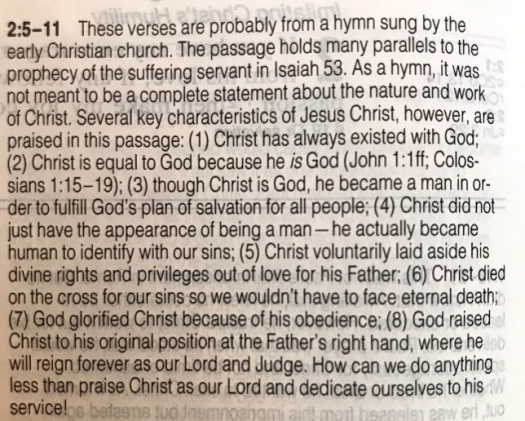Nehemiah 7: First few verses focus on Nehemiah’s instructions related to protecting the city now that the wall is finished. The overwhelming majority of this chapter focuses Nehemiah registering the families. And it was a lot of people (42,360).
Nehemiah 8: This chapter focuses on Ezra reading the Instruction Scroll from Moses. Ezra read the scroll to the people. This was followed by a celebration of the Festival of Booths. The notes indicate that this chapter focuses on Ezra and Nehemiah’s efforts to get the people back on track to honoring and following God with the hopes of preventing them from repeating past mistakes.
Nehemiah 9: We read a lengthy prayer that restates the history of the people from the very beginning. It focuses on the good and the bad. Not very specific. However, this retelling of their history leads to the people signing an agreement to follow the instruction.
Philippians 2: I especially like this chapter. Paul encourages the people to think of others over themselves. He specifically tells the people the following:
“Don’t do anything for selfish purposes, but with humility think of others as better than yourselves. Instead of each person watching out for their own good, watch out for what is better for others” (CEB Study Bible, p. 376 NT; 2.3-4).
Paul then shares what the notes say is a hymn that the church was probably already familiar with. Here’s a screenshot with some general explanation from the NIV Life Application Study Bible (p. 2148):

He then encourages the people to remain joyful, happy, and to do everything without grumbling and arguing, even the things they don’t like. He makes it clear to them that doing this will help them “be blameless and pure, innocent children of God surrounded by people who are crooked and corrupt” (2:15). To show how serious he is about the importance of remaining happy and glad, he even tells the people that he’s willing to “die for God in order to strengthen their faith” (p. 377 NT; note for 2:17).
Paul ends this chapter telling people that he will send Timothy and Epaphroditus to them. Both of them are examples of people who put the good of others above their own, directly following Christ’s example.
I really like that Paul emphasizes the importance of thinking about happiness of others over ourselves, which is what Jesus did. This seems to be a trend in Paul’s letters. We seem to see less of that now.
